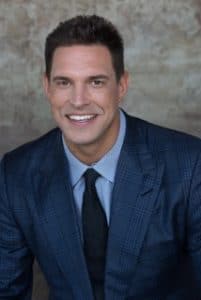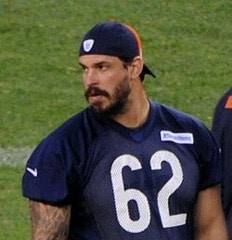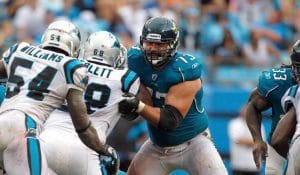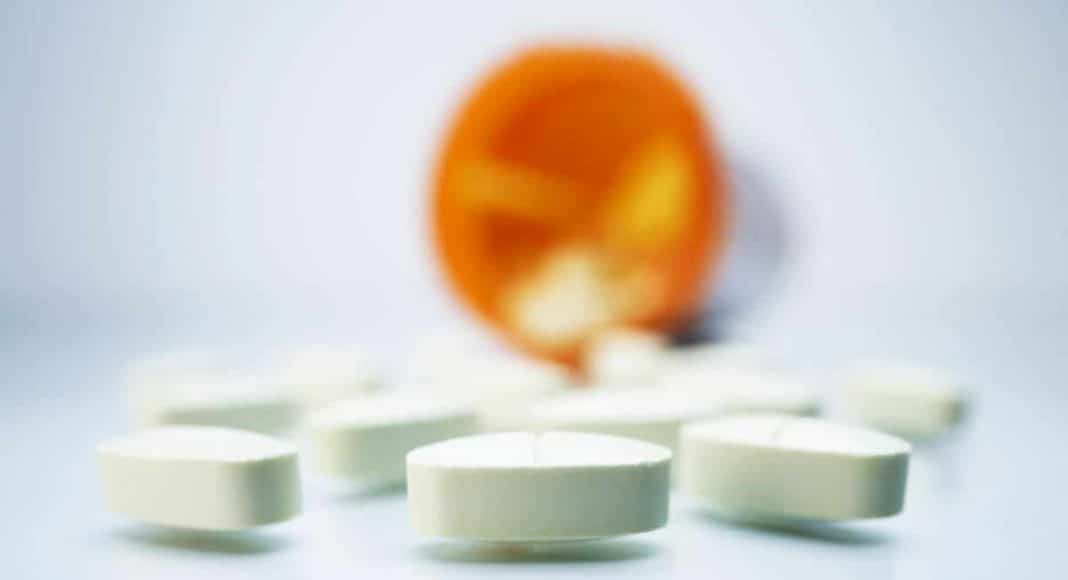Eben Britton is a man who understands pain. Within his six-year NFL playing career as an offensive lineman for the Jacksonville Jaguars and Chicago Bears, he experienced major and minor injuries alike, including a torn labrum, a hamstring injury, a herniated disc resulting in sciatica that still ails him to this day. “I can’t feel my right foot on the ground,” he tells me.
Compounding these injuries is the game of football itself, America’s most bone-crushing sport. The crunching tackles and successful blows devastate the body over time. How football addles the brain is a topic the league would prefer not to discuss. “It’s a violent game that I personally don’t think humans are supposed to play,” said Doug Whaley, the Buffalo Bill general manager, last year.

This perhaps explains why opioids and other painkillers have infected the NFL at an alarming rate. Former Detroit Lions star receiver Calvin Johnson said painkillers are handed out “like candy,” which contributed to his decision to retire earlier than many expected. More than 1,800 former players filed a lawsuit against each of the NFL’s 32 teams, alleging teams violated their players’ long-term health and federal laws controlling pain medicine. The sealed court documents describe a culture of opioid abuse and were either deceptive or didn’t inform players about the addictive medications they were taking. (A 2011 study claims retired NFL players misuse opioid pain medications more than four times than the general population.) The lawsuit goes to trial this October.
Britton believes there’s another way through cannabis. His last four years in the league, Britton used Adderall regularly to keep himself on the field, but “needed to smoke copious amounts of marijuana just to ease the comedown,” as he wrote in Sports Illustrated. In 2015, the league served Britton a four-game suspension for using Ritalin he borrowed from a teammate. He’d been taking Adderall under the NFL’s therapeutic use exemption (TEU), but the Ritalin wasn’t prescribed, so he received the same punishment as Tom Brady did for deflating footballs. The incident eventually led to Britton’s retirement from the game.
“My body was, for the most part, in good shape,” Britton says. “I wasn’t dependent on any pharmaceutical pain killers. I wasn’t having to take any prescription anti-inflammatories daily and that’s really because of cannabis.”
Since retiring, Eben Britton has become a strong advocate in cannabis legalization and urging the NFL to study the effects marijuana could have in pain management and neural protection against concussions and CTE. He also co-founded BeTru Organics, which has a holistic line of products, like creams and sprays, that uses hemp-derived CBD to help relieve pain.
I talked to Eben Britton regarding his company, the NFL’s toxic relationship to opioid painkillers and anti-inflammatories, and why cannabis could be exactly what football needs if it’s to continue as a sport.
The Fresh Toast: Can you explain how and why someone would want to use Be Tru pain relief body cream?
Eben Britton: There’s really a lot of pain in the world. We’re dealing with a lot of pain and suffering from a number of things. People have bad knees, people have bad backs, people have bad feet and that’s not even talking about professional athletes or military veterans, or law enforcement, and the fire departments. There’s a ton of pain in the world right now and really the only acceptable answer that our society seems to afford anyone is go to the doctor, get a prescription for one anti-inflammatory or another, whether it’s Cataflam or Indocin or even Advil and Tylenol.
These things taken over long periods of time and on a daily basis really wreak havoc on our systems. They destroy our digestive systems. They wreak havoc on our kidneys and liver, on our heart, on our cardiovascular system, and that’s not a sustainable answer long term. Throughout my football career, I’ve dealt with pain on a daily basis. That was part of my life, dealing with pain throughout my body and having to get up and be able to produce at a 100 percent of my capability day in and day out in practice, and then on the field on Sunday on game days.
Coming from a background of a family that was very holistically minded, food is medicine. Find any natural means possible to heal yourself before going to a doctor to be diagnosed with some ailment that they could prescribe a medication. We just didn’t look at our personal wellness and our family’s wellness in that way.
I think that feeds this intuitive gravitation towards cannabis. I’m using cannabis as part of my process in dealing with some really traumatic injuries from dislocated shoulder to herniated disc in my back that caused sciatica down my leg to a numbness in my right foot, which has lasted to this day. I can’t feel my right foot on the ground. But I feel fortunate to have had cannabis as part of my process throughout my career, and to have had that sort of intuitive knowing that this was something that my body responded much better to than the prescription drugs.
I was amazed reading your essay in SI about how much you and every athlete goes through to get ready for a game. Whether it’s you taking Adderall, different guys taking Toradol, stuff like that. The question is just how widespread, specifically within the NFL, is this sort of opioid dependence?
It sounds crazy and I said this in an interview with Bleacher Report and the guy made a comment like he didn’t believe me. But literally every single guy in an NFL locker room is taking some type of prescription drug every single day to deal with the pain. And there’s a wide spectrum. You have the guys who are very aware, very fearful, very conscious of what they’re putting in their bodies and they’re the guys who are taking like two Advil twice a week, and they’re just kind of grinding it out on that for as long as they can until they have to take something more. That transition happens from training camps through to like week six, week seven, week eight, and you build up your dosing of anti-inflammatories. [Meanwhile,] most offensive linemen, you’re on a daily dose of prescription anti-inflammatories like Indocin, or Cataflam or Celebrex daily, just to combat the muscle aches and pains, the joint pain that you’re experiencing, the pain in your neck and shoulders and that’s not even a full-blown injury.
That’s just wear and tear.
That’s just to combat the wear and tear and then, you have guys who maybe they sustained a serious injury early in the season and they’ve worked their way back, and now you’re talking about guys who are taking Toradol before games daily. I mean, my first three seasons in my career, we were still getting Toradol shots before every game. Every guy would line up in the doctor’s office prior to game day. You pull your pants down. You get a shot of Toradol right in your ass, and it’s the strongest, most powerful anti-inflammatory drug I think anybody can possibly ever take. You feel a wave of armor just crashed over you and you don’t feel any pain. You feel like you could run through a brick wall, and really you can. I mean, until the next day you wake up and you feel like you ran through a brick wall and were hit by a train.

Isn’t that creating a worse long term problem masking pain that you as a human should probably be feeling?
Exactly, yes. I mean because there’s a reason for pain, right? There’s a reason our bodies feel pain. It’s to tell us that something’s wrong. It’s a protection mechanism that our body uses to tell us what’s going on, right? I mean, so masking that, numbing that, and especially in football players, you continue to mask and numb, and mask and numb. Sooner or later, you have these guys like I just read an article maybe a month ago about a guy who played offensive line for the Giants who was taking 120 Vicodin a day. [Ed. Note: Former Giants offensive lineman Shane Olivea was taking 125 Vicodin a day. According to the Associated Press report, he spent close to $584,000 on painkillers.] You think that it sounds insane.
I’ve heard those stories in locker rooms. Guys taking fists full of opioids. At the worst stage of my dealing with pain, I was taking two to four Vicodin on Saturday. Then I was taking two Vicodin before the game and two Vicodin after the game. I was one of the lucky ones. To be a guy who felt comfortable using cannabis and enjoyed using cannabis, I really was able to keep myself from going down that deep dark hole of opioid addiction. Now because of cannabis really, I think it alleviates a lot of the withdrawal symptoms that come with taking opioids. Cannabis was that much more crucial for me.
-
Related Story: Advocates Use Super Bowl To Push Medical Marijuana For NFL
How much is it, with football in general, a cultural problem? Because it’s this warrior mentality where you’re a football player, you’re going to do whatever it takes to get on the field and then you have this older mentality from the old school where it’s like, “You just need to tough it out,” and “back in my day…”
Yeah
Add that versus the fact every football player is bigger, faster, and stronger and the collisions are getting worse and worse. You were like 310 pounds when you came into the league?
Yes.
And how much do you weigh now?
Well, now I’m 255.
Which is probably more where you should be, right?
Yeah. Oh yeah.
So you’re actually advised to put on all this extra weight—I don’t know, it seems like this circular logic of asking guys to do more and more without considering the repercussions.
I think you’re definitely on to something. I mean, that’s kind of a question of, “Is football going to last?” If something like cannabis isn’t taken seriously, with all of the issues you’re having. Concussions and CTE are just the tip of the iceberg.
I mean, we’re just starting to see opioid addiction. Guys are coming out of the league and they have nowhere to go. They’re losing their minds. They’re losing their families, and it’s really it’s like the last gladiators. In ancient Rome with the Roman gladiators, at least guys were being killed. They died doing what they loved. In football, you come out of it and you’re still a young man.
You still got to deal with it.
You have a ton of life to live. You still have to deal with all the pain and all the injuries. And really, that’s never going to change. The pain, the injuries, the violence of the game. That won’t change because that’s why we love the game of football. That’s why there’s millions upon millions of people watching every single Sunday, all around the world. We have to find the solution that can ease that side of it and I think cannabis can be that solution. If we need to start as slow as possible and from the ground up, that really begins with educating people on what CBD is and what CBD can do for pain management for the concussion epidemic, and really as a preventative for CTE. Because it’s coming. That train is coming for every guy. It’s a matter of what are you doing right now, in today, to keep yourself from going down that hole as fast as possible.
-
Related Story: ESPN Survey: 71% Of NFL Players Want Marijuana Legal
Well, I found it fascinating that last year, Roger Goodell comes out and says that the NFL’s committing 100 million dollars to studying head trauma, but then none of that includes cannabis research.
Right.
At the same time you have someone like Lester Grinspoon, a Harvard psychiatrist, who writes an open letter to Goodell saying that CBD and cannabis has possible neural protective capabilities. And we’re not looking into this at all? It just seems so backwards.
Well, he’s going to choke on that. If he doesn’t start opening his eyes because that’s a dead end street no looking at cannabis. Nothing else is doing that. To say there’s no research to prove that there’s even a chance that cannabis works as a neuro-protectant and can heal the brain after trauma and prevent CTE? The fact that they can still say that with a clear conscience, it’s just bullshit.
Studies have been mounting—I mean, for thousands and thousands of years before the development of Western medicine, before the development of science and research, how did we pass along our understanding of the things that can heal us? It’s through word of mouth. It’s through anecdotal experience. Elders told the next generation, “Hey, this plant that grows from the ground. This has been around for thousands and thousands of years, and we’ve been using it in various ways, smoking it, turning it into tea, cooking it down to an oil.” This is not new.
It’s probably changing now. It’s probably starting to shift. I think the avalanche is coming and it’s really coming at an unstoppable rate. People are not accepting their fate any longer, [they’re not] just sitting back and allowing doctors to throw pills at them anymore. [They’re saying,] “Hey, fuck that. I need something that’s actually going to heal me. I want to be here. I want to be here for my family. I want to be here for my kids. I want to be here for my partner.”

The NFL—I think they’re missing out on a gigantic opportunity to make a huge impact on the world of medicine, on our healthcare system, on how we view personal healing and wellness. If they don’t accept the fact that the NFL is the vehicle for the most extreme case study of the medical efficacy of cannabis and CBD? It’s right there. Every single team. They’ve got 32 teams that if they took one of them and started giving guys CBD pills before and after practices, before and after games, I bet they would see a huge difference with regards to the effect on brain health, the effect of the amount of pills that are given out, and really on overall well-being and health throughout teams.
Well, is it the league and its own cultural conservativism? Or is this, as you said, a larger cultural stigma with the misinformation being spread about keeping cannabis from being tested and being accepted? So is it the NFL or is it their response in existing within this bigger cultural stigma toward cannabis?
I think there’s both things going on. I think the federal government keeping marijuana as a Schedule I narcotic is just laughable. I mean, it’s a joke. It’s an absolute joke. It doesn’t even make sense. It makes me angry actually. The more you understand this, the more absurd it becomes. So that’s definitely an issue and that’s something that needs to be addressed on the federal level, andI think we’re starting to see a shift in that. Even with Attorney General Jeff Sessions stepping in there, I don’t think anything can be done to reverse what 28 States have done to legalize medical or recreational marijuana at this point. States are going to keep pushing it and then at the federal level, they’re going to have to adjust that. In my opinion, that is totally de-scheduling, that’s 100% de-scheduling marijuana off of any of those lists.
That being said, I think that the NFL has so much power. It’s an absolute juggernaut in our society, in our culture, in this country. It’s just an absolute media-driven juggernaut and I think that if any group, any organization really has the power to make an impact on something like cannabis, the scheduling of cannabis on a federal level, I think it would be something like the NFL that has so much of an outreach. No one in the federal government is going to come and say, “The NFL’s shut down.”
No.
It can be worked out. It can be mapped out. There’s people smart enough or people in the right places on both sides, from the NFL to the federal government that they can map it out on how to create the proper study. I think if there’s any organization or group that can make a dent in the federal government’s position on marijuana, it would be the NFL.
Yes, it seems they should want to do that considering a significant portion of former employees are coming out like you, Kyle Turley, Nate Jackson, Eugene Monroe, and even a current player, like Tennessee linebacker Derrick Morgan who is promoting medicinal marijuana research. And I don’t understand why they wouldn’t want to be the vehicle for that especially when the guys who are speaking out against it are the ones who are probably experiencing the most pain playing in the trenches and being physically battered every single game.
Yeah.
So, I’m not sure where it goes from here. Do you think it will change within the NFL first? Or do you think that it will be a larger cultural movement that the NFL eventually responds to?
I think the NFL is actually really starting the hear all of us. I think that their needle is starting to move. I think they’re going to use it as a bargaining chip in the next collective bargaining agreement negotiations.
These people aren’t dumb. These are highly intelligent individuals. I mean the organization as a whole might seem trapped in an old mindset, but these are really smart people who know exactly what’s going on, and they’re not stupid. And they need to find an answer to certain issues ASAP. Especially in this day and age, which is kind of the beauty of social media and the internet. It’s keeping those people in high places accountable, because the truth will find its way out to the surface. And people aren’t going to stand for lies, and deceit, and non-action. People want to see results. People want to see people being taken care of, and people want to see positive movement. I think that we’re seeing it already. The NFLPA has said that they are going to put it on the table as far as at least a lessening of punishment, whatever that means.
They’re going to lessen the punishment for anyone who fails the drug test for cannabis. But I think the NFL, really, needs to move faster than the federal government is going to.
I agree.
And I think they need to move independently of that. Maybe in 15 years, we’re looking at a situation where marijuana is legalized in 50 states and the Federal government still has it scheduled as a schedule one narcotic. I mean I could see that being the case. As hypocritical and as ridiculous as that sounds, I can see that happening.
[gravityform id=”13″ title=”false” description=”true”]


